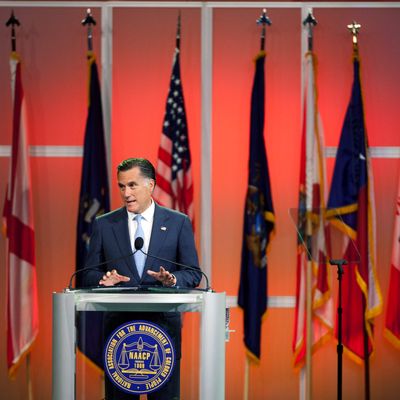
It is hard to recall now, but when Mitt Romney originally set out to define his second presidential campaign, in the immediate aftermath of his 2008 Republican primary defeat, he cast himself as a candidate focused like a laser on the goal of … refusing to publicly acknowledge any historical failures in the field of international conduct, ever, for any reason. Romney’s book, No Apology, seized upon what appeared at the outset of Obama’s presidency to be his weakness: the young president’s lack of foreign policy experience.
Romney hits the theme again today in his speech before the Veterans of Foreign Wars. His overarching theme is that he, unlike certain current presidents he could name, loves America absolutely and without qualification:
From Berlin to Cairo to the United Nations, President Obama has shared his view of America and its place among nations. I have come here today to share mine.
I am an unapologetic believer in the greatness of this country. I am not ashamed of American power. I take pride that throughout history our power has brought justice where there was tyranny, peace where there was conflict, and hope where there was affliction and despair. I do not view America as just one more point on the strategic map, one more power to be balanced. I believe our country is the greatest force for good the world has ever known, and that our influence is needed as much now as ever.
Of course, Obama has repeatedly defended America’s goodness and its exceptional place in the world. The difference runs along somewhat the same lines as their defenses of capitalism (which Obama calls “the greatest force for economic progress in human history,” but which he also believes has some downsides in need of correction, in contrast to Romney’s unqualified defense). In the speeches in question, Obama has argued before skeptical foreign audiences that America is great and good despite its blemishes, which seems both like a more persuasive defense and a more effective approach to persuading skeptical non-Americans. (Rule of thumb: Convincing people that your country is No. 1 is easier than convincing people that some other country is No. 1.)
It is those concessions to past failures — i.e., “We’ve made our share of mistakes, and there are times when our actions around the world have not lived up to our best intentions.” — that offer Romney his opening. Romney’s theme was also previewed the other day by unofficial campaign spokesperson Jennifer Rubin, who quoted Obama’s overseas admissions of American imperfection, concluding, “Obama then went on to praise his country, but why the need to run it down first?”
It is not clear whether Romney believes Obama’s “apologies” were wrong as a matter of fact — that the U.S., in Romney’s view, has never made any significant mistake in its international conduct — or simply that such mistakes should never be admitted, even in the course of a broader defense. Would any serious international affairs expert of any stripe endorse either proposition? The worldview is sheer belligerent nationalism, completely inimical to actual thought. In hard times, people grow more open to the appeals of nationalist demagogues. Whether or not it reflects his authentic self, this is in part what Romney is offering to the voters.






























